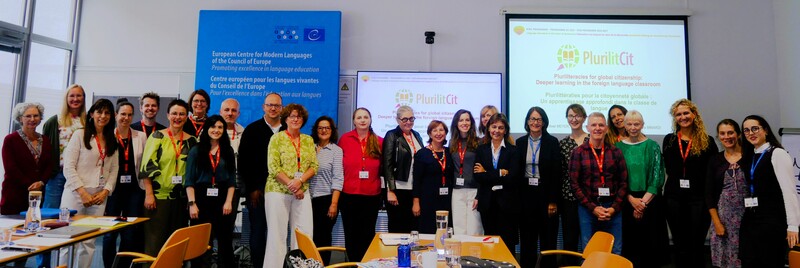News items
30.10.2024
Fostering global citizenship through pluriliteracies: Insights and reflections from the ECML network meeting
On September 17-18, the ECML in Graz hosted the first network meeting of the project “Pluriliteracies for global citizenship: Deeper learning in the foreign language classroom”. Twenty participants from 16 countries, including teachers, teacher educators, and university professionals, came together to explore key concepts and collaborative strategies aimed at enhancing global citizenship through pluriliteracies.
The meeting kicked off with a project overview, led by the project team, who introduced the main objectives and concepts of the initiative. Inspiring plenary sessions were delivered by experts Do Coyle and Christina Pylonitis, sparking insightful discussions among attendees. Participants engaged in meaningful dialogue in an open and collaborative atmosphere, reflecting on how the pluriliteracies approach can transform language education.
Central to the discussions was the 4R model, which provided a framework for rethinking language teaching and learning. Special emphasis was placed on the role of multimodality, multi-source reading, and integrating diverse perspectives to better address the realities of today’s classrooms.
The two-day event concluded with a draft list of key messages for educators and the establishment of a growing professional community, setting the stage for continued collaboration and action in advancing the goals of pluriliteracies and deeper learning in language education.
Merilin Aruvee, Silvia Minardi, Kathrin Jonas Lambert

02.07.2021
Just published: Pluriliteracies teaching for deeper learning
In their book Beyond CLIL: Pluriliteracies teaching for deeper learning, Do Coyle (University of Edinburgh, UK) and Oliver Meyer (Johannes Gutenberg Universität Mainz, Germany) propose a new 'pluriliteracies' approach which refines and develops current thinking in CLIL and show how to put that understanding into practice. This resource will be valuable to both academics and education practitioners.
The book is based on the work of the ECML on “A pluriliteracies approach to teaching for learning”, among others.
- Coyle D. & Meyer O. (2021), Beyond CLIL: Pluriliteracies teaching for deeper learning, Cambride University Press: description and key features
You can further explore the work of the ECML in this field here:
23.07.2020
CLIL, languages other than English (LOTE), successful transitions: A first web-based expert meeting
How do we define CLIL and plurilingual education? Which kind of projects have we been involved in - on CLIL and plurilingual education across educational levels? How will we organise this new three-year ECML project?
At this web-based expert meeting we (1) got to know each other and discussed our understanding of the field and our context, (2) agreed on project organisation and design, and (3) defined the next steps.
Building on previous ECML projects, our project will develop recommendations to implement CLIL in languages other than English (LOTE) across educational levels (primary, secondary, tertiary), both in the language classroom and other subjects. Furthermore, the project will promote pluralistic approaches to languages in CLIL (CLsIL).
In this first year, our project will among others
- systematically review what has been done in previous CLIL/CLsIL projects;
- collect recommendations, models and teaching materials from different contexts;
- synthesise existing resources and develop a first draft of recommendations to implement CLIL in LOTE across educational levels;
- initiate a collaboration with associated partners and the ECML national contact points.
In 2021, the project will invite other experts to a network meeting, and in 2022, we will organise a workshop for representatives of the member countries of the ECML. One of the main goals of our project is to illustrate the recommendations through practice examples from various contexts.
Please get in touch, if you are interested to share your knowledge and experiences, or if you would like to participate in our events!
Author: Petra Daryai-Hansen
More information